- Home
- Mario Puzo
The Last Don Page 3
The Last Don Read online
Page 3
Gronevelt had led the way in convincing the public that gambling was not a sordid vice but a middle-class source of entertainment, as normal as golf or baseball. He had made gambling a respectable industry in America. All of Las Vegas wanted to honor him.
Cross put aside his own personal emotions. He felt a deep sense of loss; there had been a genuine bond of affection between them throughout his whole life. And now Cross owned fifty-one percent of the Hotel Xanadu. Worth at least $500 million.
He knew his life must change. Being so much more powerful and rich, he would have to be in more danger. His relationship with Don Clericuzio and his Family would become more delicate, in that he was now their partner in an enormous enterprise.
The first call Cross made was to Quogue, where he spoke to Giorgio, who gave him certain instructions. Giorgio told him that none of the Family would attend the funeral except Pippi. Also, Dante would be on the next flight out to complete the mission already discussed, but he was not to attend the funeral. The fact that Cross now owned half the Hotel was not mentioned.
There was a message from his sister, Claudia, but when he called, he got her answering service. There was another message from Ernest Vail. He liked Vail and was carrying fifty grand of his markers, but Vail would have to wait until after the funeral.
There was also a message from his father, Pippi, who was a lifelong friend of Gronevelt. And whose advice he needed on how to conduct his future life. How would his father react to his new status, his new wealth? That would be as ticklish a problem as dealing with the Clericuzio, who would have to adjust to the fact that their Bruglione in the West was so powerful and wealthy in his own right.
That the Don himself would be fair, Cross had no doubt; that his own father would support him was almost a given. But the Don’s children, Giorgio, Vincent, and Petie, how would they react, and the grandson, Dante? He and Dante had been enemies since they were baptized together in the Don’s private chapel. It was a running joke in the Family.
And now Dante would be arriving in Vegas to do the “job” on Big Tim the Rustler. That bothered Cross because he had a perverse fondness for Big Tim. But his fate had been decided by the Don himself, and Cross worried about how Dante would do the job.
The funeral for Alfred Gronevelt was the grandest ever seen in Las Vegas, a tribute to genius. His body lay in state in the Protestant church his money had built, which combined the grandness of European cathedrals with brown slanting walls from Native American culture. And with famed Vegas practicality, a huge parking lot, decorated with Native American motifs rather than European religious.
The choir that sang the praises of the Lord and recommended Gronevelt to Heaven was from the university where he had endowed three chairs in the humanities.
Hundreds of mourners who had graduated from college because of scholarships Gronevelt had funded looked truly grieved. Some of the crowd were high rollers who had lost fortunes to the Hotel and seemed mildly cheered that at last they had triumphed over Gronevelt. Women, on their own, some middle-aged, wept silently. There were representatives from the Jewish synagogues and Catholic churches he had helped to build.
It would have been against everything Gronevelt believed in to shut down his casino, but there were those managers and croupiers who were not on the day shift. Even some recipients of the Villas made their appearance and were accorded special respect by Cross and Pippi.
The governor of the state of Nevada, Walter Wavven, attended the funeral, escorted by the mayor. The Strip itself was cordoned off so that the long procession of silver hearses, black limos, and mourners on foot could follow the body to the cemetery and Alfred Gronevelt could pass through, for the last time, the world he had created.
That night the citizen visitors of Vegas gave Gronevelt the final tribute he would have most loved. They gambled with a frenzy that set a new record for the “Drop,” except of course for New Year’s Eve. They buried their money with his body to show their respect.
At the end of that day, Cross De Lena prepared to begin his new life.
That night, sitting alone in her beach house in the Malibu Colony, Athena Aquitane tried to decide what to do. The breeze from the ocean coming through the open doors made her shiver as she sat on the couch thinking.
It is hard to imagine a world-famous movie star as she was when she was a child. Hard to imagine her going through the process of becoming a woman. A movie star’s charisma is so powerful that it seems as if their adult images as heroes, as beauties, had sprung full grown out of the head of Zeus. They never had a history of bed-wetting, never had acne, never had an ugly face to grow out of, never had the shrinking shyness and nerdiness of adolescence, never masturbated, never begged for love, never were at the mercy of fate. It was very hard, now, for Athena even to remember such a person.
Athena thought that she had been born as one of the luckiest people on earth. Everything came to her naturally. She had a wonderful father and mother, who recognized her gifts and nurtured them. They adored her physical beauty but did everything in their power to educate her mind. Her father tutored her in sports, her mother in literature and the arts. She could never remember a time in her childhood that she had been unhappy. Until she was seventeen years old.
She fell in love with Boz Skannet, who was four years older, a regional football star at his college. His family owned the biggest bank in Houston. Boz was almost as handsome as Athena was beautiful, plus he was funny, he was charming, he adored her. Their two perfect bodies came together like magnets, nerve endings high voltage, flesh all silk and milk. They entered a special heaven and, to ensure that this would last forever, they married.
Within a few short months Athena became pregnant, yet with her usual bodily perfection, she gained very little weight; she never felt sick and enjoyed the idea of having a baby. So she continued going to college, studying drama, and playing golf and tennis. Boz could overpower her in tennis, but she beat him easily in golf.
Boz went to work in his father’s bank. Once she had the baby, a little girl whom she’d named Bethany, Athena continued going to school, since Boz had enough money to hire a nanny and a maid. Marriage made Athena even more hungry for knowledge. She read voraciously, especially plays. She was delighted by Pirandello, dismayed by Strindberg; she wept over Tennessee Williams. She grew more vibrant, her intelligence framed her physical beauty by giving it dignity that beauty sometimes does not have. It was not surprising that many men, young and old, fell in love with her. Boz Skannet’s friends envied him having such a wife. Athena prided herself in her perfection, until in later years she found that this very perfection irritated many people, including friends and lovers.
Boz joked that it was like a Rolls that he had to park in the street every night. He was intelligent enough to know that his wife was destined for greater things, to know that she was extraordinary. And he could see very clearly that he was fated to lose her, as he had lost his own dreams. There had been no war to prove his courage, though he knew himself to be fearless. He knew he had charm and good looks but no particular talent. He was not interested in amassing a huge fortune.
He was jealous of Athena’s gifts, her certainty of her place in her world.
So Boz Skannet went forward to meet his fate. He drank to excess, he seduced his colleague’s wives, and at his father’s bank, he initiated shady transactions. He became proud of his cunning, as any man does of a newly acquired skill, and used it to hide his growing hatred of his wife. For was it not heroic to hate one so beautiful and perfect as Athena?
Boz’s health was extraordinary despite debauch. He clung to it. He worked out in the gym, took boxing lessons. He loved the physicality of the ring, where he could smash his fist into a human face; the cunning of switching from jab to hook; the stoicism of receiving punishment. He loved hunting, the killing of game. He loved the seduction of naÏve women, the schematism of romance.
Then with his newfound cunning he thought of a way out. He and Athena wo
uld have more children. Four, five, six. That would bring them together again. That would stop her from leaping up and away from him. But by that time Athena could see this for what it was and said no. She said more. “If you want children, have them with the other women you’re screwing.”
It was the first time that she had spoken coarsely to him. He was not surprised that she knew of his unfaithfulness, he had not attempted to hide it. In fact, that was his cunning. Then it would be he who had driven her away, not she who had left.
Athena observed what was happening to Boz, but she was too young and too intent on her own life to give it the necessary attention. It was only when Boz turned cruel that Athena, at twenty years of age, found the steel in her character, an impatience with stupidity.
Boz started playing those clever games of men who hate women. And it seemed to Athena that he was actually going insane.
He always picked up their dry cleaning on his way home from work, because as he often said, “Honey, your time is more valuable than mine. You have all your special classes in music and drama besides your degree work.” He thought she would not detect his spiteful reproach because of the offhand tone of his voice.
One day Boz came home carrying an armload of her dresses while she was taking a bath. He looked down at her, all gold hair and white skin, rounded breasts and buttocks decorated with foamy soap. His voice thick, he said, “How would you like it if I threw this shit right into the tub with you?” But instead, he hung the clothes in the closet, helped her out of the water, and rubbed her dry with rosy pink towels. Then he made love to her. A few weeks later the scene was repeated. But this time he threw the clothes in the water.
One night he threatened to break all the dishes at dinner but did not. A week later, he smashed everything in the kitchen. He always apologized after these instances. Always tried to make love afterward. But now Athena refused him and they slept in separate bedrooms.
Another night at dinner Boz held up his fist and said, “Your face is too perfect. Maybe if I broke your nose, it would have more character, like Marlon Brando.”
She ran into the kitchen, and he followed her. She was terribly frightened and picked up a knife. Boz laughed and said, “That’s the one thing you can’t do.” And he was right. He easily took the knife away from her. “I was only kidding,” he said. “You’re only fault is you have no sense of humor.”
Athena, at twenty, could have turned to her parents for help, but she did not, nor did she confide in friends. Instead she carefully thought things out, she trusted her intelligence. She saw that she would never finish college, the situation was too dangerous. She knew the authorities could not protect her. She considered briefly a campaign to make Boz truly love her again so that he would be the old Boz, but now she had such a physical aversion to him that she couldn’t stand even the thought of him touching her, and she knew that she would never be able to give a convincing performance of love, though that option appealed to her dramatic sense.
What Boz did that finally forced her hand and made her certain she had to leave didn’t have to do with her, it concerned Bethany.
He often tossed their one-year-old daughter into the air playfully and then pretended he was not going to catch her, only doing so with a last-minute lunge. But once he let the infant bounce, accidentally it seemed, on the sofa. And then finally one day he quite deliberately let the little girl fall to the floor. Athena gasped with horror and rushed to pick the baby up, to hold her, to comfort her. She stayed awake all night sitting beside the crib of the infant to be certain she was all right. Bethany had a fearful lump on her head. Boz tearfully apologized and promised he would no longer tease in such a fashion. But Athena had come to a decision.
The next day she cleared out her checking account and her savings account. She made intricate travel arrangements so that her movements could not be followed. Two days later, when Boz came home from work, she and the baby had disappeared.
Six months later Athena surfaced in Los Angeles, without a baby, and started her career. She easily got a mid-level agent and worked in small theater groups. She starred in a play at the Mark Taper Forum that led to small parts in small movies, and then was cast in a supporting role in an A movie. In her next picture she became a Bankable Star, and Boz Skannet re-entered her life.
She bought him off for the next three years, but she wasn’t surprised by what he did at the Academy. An old trick. This time just a little joke . . . but the next time, that bottle would be full of acid.
“There’s a big flap at the Studio,” Molly Flanders told Claudia De Lena that morning. “A problem with Athena Aquitane. Because of the attack at the Academy Awards, they’re worried she won’t go back to work on her picture. And Bantz wants you at the Studio. They want you to talk to Athena.”
Claudia had come to Molly’s office with Ernest Vail. “I’ll call her as soon as we finish here,” Claudia said. “She can’t be serious.”
Molly Flanders was an entertainment lawyer, and in a town of fearsome people she was the most feared litigator in the motion picture business. She absolutely loved fighting in the courtroom, and she nearly always won because she was a great actress and had a superb grasp of the law.
Before getting into entertainment law, she had been the premier defense attorney in the state of California. She had saved twenty murderers from the gas chamber. The worst any of these clients had to suffer was a few years for different degrees of manslaughter. But then her nerves had given way and she had switched to entertainment law. She often said it was less bloody and it had greater and more witty villains.
Now she represented A-picture directors, Bankable Stars, top-notch screenwriters. And on the morning after the Aca-demy Awards, one of her favorite clients, Claudia De Lena, was in her office. With her was her screenwriting partner of the moment, a once famous novelist, Ernest Vail.
Claudia De Lena was an old friend, and though one of the least important of Flanders’s clients, the most intimate. So when Claudia asked her to take on Vail, she agreed. Now she regretted it. Vail had come with a problem that even she couldn’t solve. Also, he was a man she could feel no affection for, though she usually learned to like even her murder clients. Which made her feel a little guilty about giving him bad news.
“Ernest,” she said, “I went over all the contracts, all the legal papers. And there is no point in your continuing to sue LoddStone Studios. The only way you can get the rights back is to croak before your copyright expires. Which means sometime in the next five years.”
A decade before, Ernest Vail had been the most famous novelist in America, praised by critics, read by a vast public. One novel had a franchise character LoddStone had exploited. They bought the rights, made the picture, and achieved an enormous success. Two sequels also made a fortune in profit. The Studio had on its drawing board four more sequels. Unfortunately for Vail his first contract had given all the rights to the characters and title to the Studio, on all planets in the universe, in all forms of entertainment, discovered and undiscovered. The standard contract for novelists who had not yet amassed clout in movies.
Ernest Vail was a man who always had a grim, sour expression on his face. For which he had good reason. The critics still acclaimed his books, but the public no longer read them. Also, despite his talent, he had made a mess of his life. During the last twenty years his wife had left, taking their three children with her. On the one book that had become a successful movie, he had made a one-time score, but the Studio would make hundreds of millions over the years.
“Explain that to me,” Vail said.
“The contracts are foolproof,” Molly said. “The Studio owns your characters. There’s only one loophole. Copyright law states that when you die all rights to your works revert to your heirs.”
For the first time Vail smiled. “Redemption,” he said.
Claudia asked, “What kind of money are we talking about?”
“On a fair deal,” Molly said, “five percent of gro
ss. Figure they get five more pictures out of it and they are not disasters, total rentals, a billion worldwide, so we’re talking around thirty or forty million.” She paused for a moment and smiled sardonically. “If you were dead, I could get your heirs a much better deal. We’d really have a gun to their heads.”
Vail said, “Call the people at LoddStone. I want a meeting. I’ll convince them that if they don’t cut me in, I’ll kill myself.”
“They won’t believe you,” Molly said.
“Then I’ll do it,” Vail said.
“Talk sense,” Claudia said amiably. “Ernest, you’re only fifty-six years old. That’s too young to die for money. For principle, for the good of your country, for love, sure. But not for money.”
“I have to provide for my wife and kids,” Vail said.
“Your ex-wife,” Molly said. “And for Christ’s sake, you’ve been married twice since.”
“I’m talking about my real wife,” Vail said. “The one who had my kids.”
Molly understood why everybody in Hollywood disliked him. She said, “The Studio won’t give you what you want. They know you won’t kill yourself, and they won’t be bluffed by a writer. If you were a Bankable Star, maybe. An A director, maybe. But never a writer. You’re just shit in this business. Sorry, Claudia.”
Claudia said, “Ernest knows that and I know that. If everybody in this town wasn’t scared to death of a blank piece of paper, they’d get rid of us entirely. But can’t you do something?”
Molly sighed and put in a call to Eli Marrion. She had enough clout to get through to Bobby Bantz, the president of LoddStone.

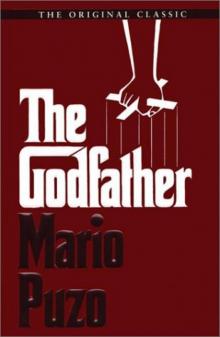 The Godfather
The Godfather The Dark Arena
The Dark Arena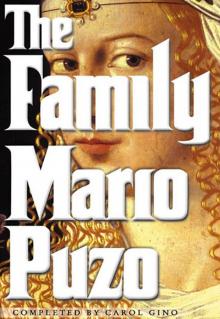 The Family
The Family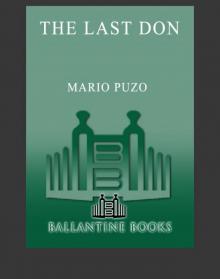 Last Don
Last Don The Sicilian
The Sicilian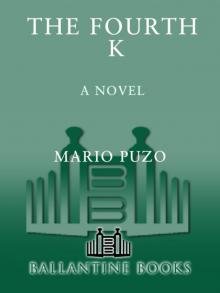 The Fourth K
The Fourth K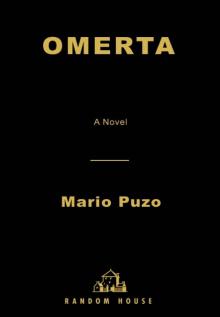 Omerta
Omerta Six Graves to Munich
Six Graves to Munich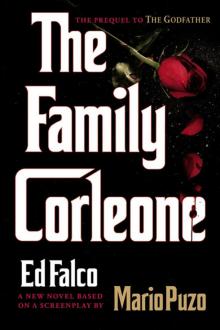 The Family Corleone
The Family Corleone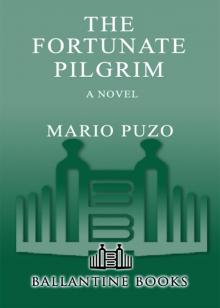 The Fortunate Pilgrim
The Fortunate Pilgrim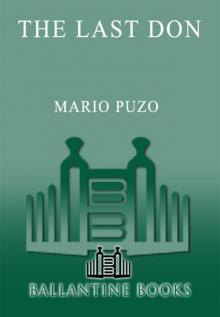 The Last Don
The Last Don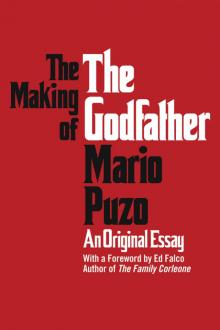 The Making of the Godfather
The Making of the Godfather Fools die
Fools die The Sicilian (v2.0)
The Sicilian (v2.0)